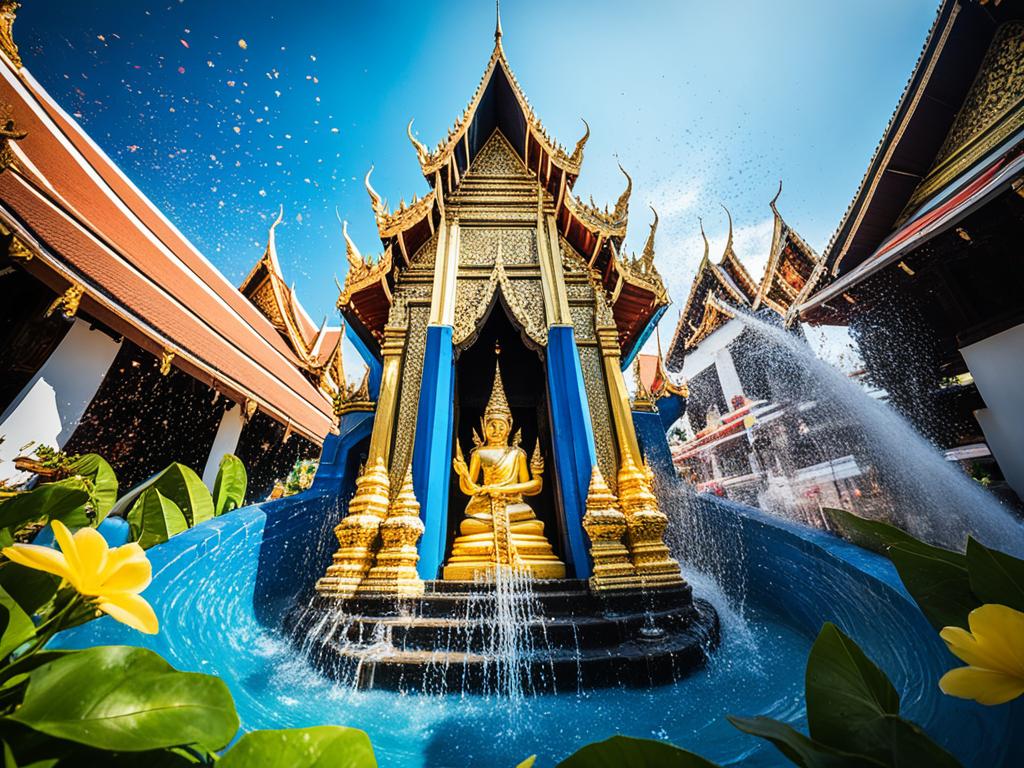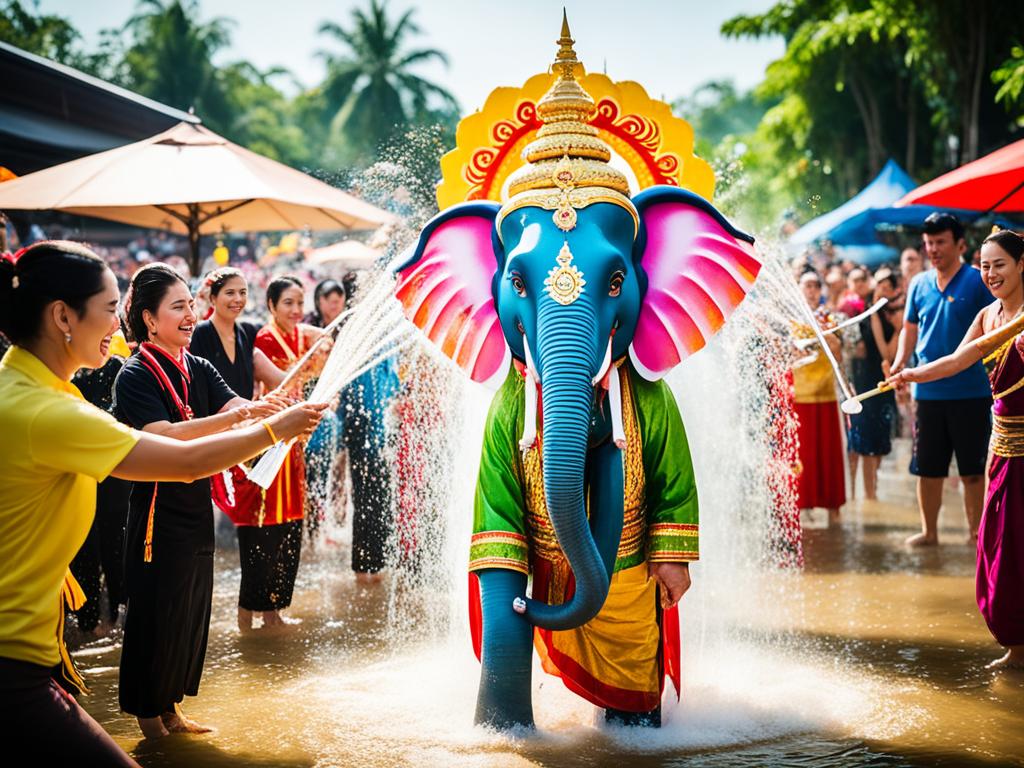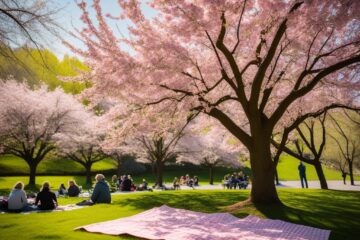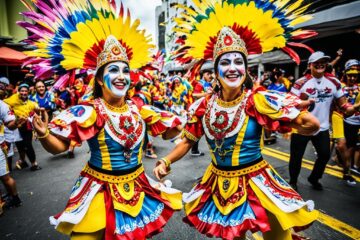Imagine being in Thailand during the Songkran festival. You’re surrounded by happy people, laughing and playing. Splashing water hits your skin, and you instantly feel renewed. Songkran is a time of celebration, known as the Thai New Year.
The festival is celebrated by having fun water fights. It’s not just about getting wet, but about starting fresh. People enjoy music and laughter in the streets while splashing water around. This act cleanses their bodies and spirits.
Key Takeaways:
- Songkran is a traditional Thai New Year celebration.
- It is marked by lively water fights as a symbol of cleansing and renewal.
- The festival is deeply rooted in Thai culture and celebrated with great enthusiasm.
- Songkran takes place in mid-April and is a time of new beginnings.
- During the festival, the streets of Thailand come alive with laughter and joy.
The History and Significance of Songkran Water Festival
Songkran is the Thai New Year and is full of culture and religion. This Buddhist holiday happens in mid-April. It’s a time to celebrate and think about new beginnings. The festival has a long history and has become the fun water party we know today.
The festival starts the Thai New Year and ends the dry season. People believe the skies open to clean the Earth. This marks the beginning of a new cycle.
Throwing water on each other is a big part of Songkran. Water symbolizes washing away bad luck and starting fresh. It’s also a way to show respect to older people. People hope for a good year by getting blessings from them.
The festive water fights are a more recent but fun addition to Songkran. Everyone hits the streets with water guns and buckets. It shows the happy and playful spirit of the Thai people.
During the festival, there are many traditions about cleaning up and starting over. People visit temples to pray and do good deeds. Monks bless them in these ceremonies.
Songkran is loved by Thais and visitors from everywhere. It’s a time to join in with local customs. People from different parts of the world can come and share the joy.
The following table provides a summary of the key aspects of Songkran:
| Key Aspects | Description |
|---|---|
| Thai New Year traditions | The festival marks the start of the Thai New Year and is deeply rooted in Thai culture. |
| History of Songkran | Songkran has ancient origins, evolving from Buddhist rituals into a vibrant water festival. |
| Buddhist holiday | Songkran is a Buddhist holiday, with temples playing a central role in the celebrations. |
| Water splashing | Water is used for cleansing and purification, symbolizing the washing away of the past. |
| Cleansing and purification | Songkran represents a time for individuals to reflect, cleanse their spirits, and start anew. |
Songkran Celebrations in Chiang Mai and Wat Pho
Chiang Mai, Thailand’s cultural heart, is famous for its lively Songkran festivities. The city buzzes with fun during the festival, featuring water fights, parades, and performances. Songkran in Chiang Mai is a charming mix of tradition and exhilaration, drawing crowds from across the globe.
Songkran Water Fights in Chiang Mai
The Chiang Mai Songkran’s most exciting part is its famous water fights. People take to the streets with water guns and buckets, turning the city into a joyful battlefield. This custom of soaking each other marks the Thai New Year as a time for freshness and new beginnings.
The most memorable water fight is the one around the Old City’s moat. Thousands gather, locals and tourists alike, to join in. With laughter echoing and color splashes abounding, the moat turns into a spectacular scene.
Wat Pho Water Fights
While Chiang Mai shines, Bangkok’s Wat Pho also hosts an epic Songkran. Known for its huge reclining Buddha, the temple becomes a water fight haven.
People visit Wat Pho just to participate in the watery festivities. The mix of ancient practices and modern fun creates a special, unforgettable ambiance at the temple during Songkran.
Talat Nat Songkran Celebrations
Don’t forget the fun at Talat Nat in Bangkok during Songkran. This “big market” streets turns into a lively carnival with music, dances, and delicious food.
It’s a place to celebrate with friends and family, enjoying local culture and savoring traditional dishes. This event is a sensory delight, a chance to dive into Thailand’s deep-rooted customs.

Chiang Mai Songkran, Wat Pho Water Fights, and Talat Nat Songkran Celebrations
The Songkran acts in Chiang Mai, Wat Pho, and Talat Nat are large and full of life. They embody Thailand’s beautiful culture and the joy of renewal on Songkran. You could splash into the water fights in Chiang Mai or enjoy the festivities at Wat Pho and Talat Nat for a remarkable Thai New Year.
| Location | Highlights |
|---|---|
| Chiang Mai | – Vibrant water fights throughout the city – Procession of “Phra Buddha Sihing” statue |
| Wat Pho, Bangkok | – Temple grounds transformed into a water fight battleground – Opportunity to explore the renowned Wat Pho temple |
| Talat Nat, Bangkok | – Lively street fair with music, dance, and food stalls – Celebration of Thai New Year traditions |
COVID-19 Impact on Songkran Celebrations
The COVID-19 pandemic changed how Songkran, the traditional Thai New Year, is celebrated. The usual water fights were not allowed because of health concerns. Many places canceled or changed these big water events.
People and groups came up with new ways to enjoy Songkran safely. They used the internet for virtual parties. These online gatherings let everyone stay connected while celebrating safely. People even had fun with virtual water fights by splashing water on their screens.
Some kept the festival’s spirit by doing small water rituals at home. These include pouring water on objects or each other. Outdoor activities, like water gun fights in small groups, were also popular. These kept everyone safe while enjoying the holiday.
The absence of large water fights didn’t stop Songkran. The Thai community showed great strength by adjusting to these challenges. Even in these difficult times, people kept the festival’s celebration and joy alive. It showed that the spirit of Songkran is strong no matter what.
Conclusion
Songkran is the vibrant celebration of Thai New Year. It’s deeply rooted in Thai culture. This festival welcomes renewal and joy in a unique way. With water fights, parades, and traditional rituals, it brings life to Thailand.
Although COVID-19 made things tough, Songkran’s spirit stayed strong. It’s a time of happiness with water fights and embracing Thai traditions. It helps in letting go of old grudges and welcoming new beginnings.
The pandemic forced changes to large gatherings, but the Thai people adapted. Throughout this article, we’ve looked at Songkran’s history and impact. This festival, from ancient Buddhist beginnings to now, continues to grow.
Whether in Chiang Mai, Bangkok, or at home, Songkran remains special. It celebrates Thai culture and the resilience of the Thai people. Through water fights, it renews the nation’s spirit. As we hope for future celebrations, let’s cherish Songkran’s traditions and unity.




